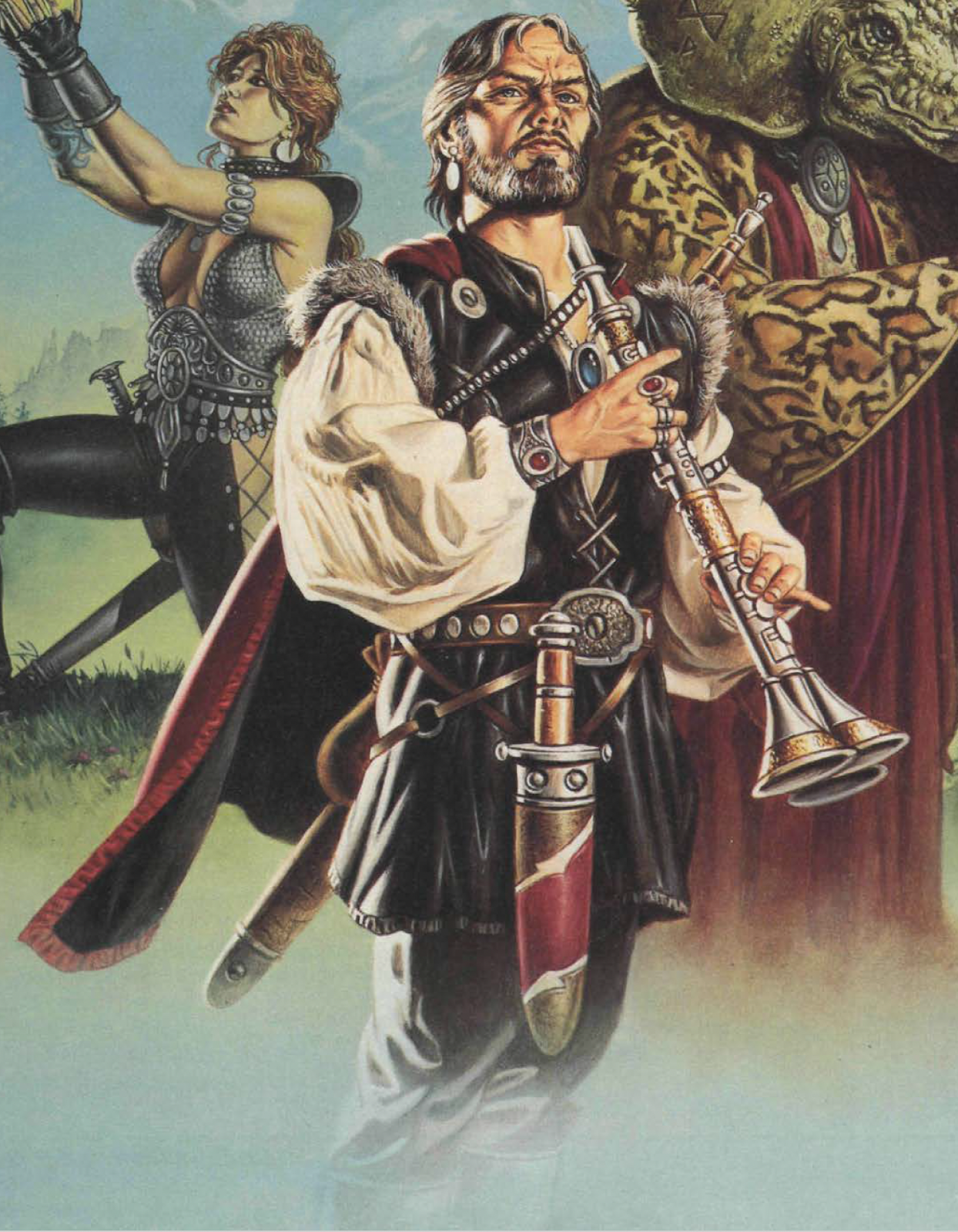Class Work: Bards in AD&D
As an adult, my favorite class is the regular fighter, though I did enjoy playing a paladin straight for a campaign's worth.
As a teenager, I did not mirror myself in glory fantasies or related all that well my own masculinity (so fighter wasn't all that for me) and power fantasies were rather fleeting for me (and so Wizards, while cool, were also a fleeting fascination for me). What I really related to was the second edition Bard.
Not because I saw myself as a budding minstrel, but for all the non-entertainment aspects of the class. A jack-of-all-trades, extending even to magic, who seems to adventure, not for glory or power, but simply for the sake of adventure. That was something that resonated a lot with my teenage self.
Reflecting on this today, makes me think on the strange fit the Bard is setting-wise.
 |
| This bard is about to rock your world with his flute and fat shortsword. |
I mean, what's the deal with a minstrel that knows magic and a bit of everything? Do all minstrels learn magic? What makes bards special? Why do they even exist?
Who are these people who wander the world, learning combat, magic, cutpursing, legend lore and many other things, and express their accomplishment through performance?
Setting all my pre-conceptions aside and just thinking on what such a character would be like, my first impression is these people are itinerant bohemian renegades, standing outside established society (and thus, the opposite of the celtic bard in this sense) and become jack-of-trades because they wish to experience and try all things. Adventuring is essentially baked into their mindset.
Would they have their own informal society? I think they would have to. They skillsets are too deep to not have some sort of common association where knowledge and skill is exchanged and taught and help somewhat homogenise what it means to be a Bard.
I am inspired by the vagabond culture and society here in Denmark, also called "country road knights." I am unaware of their existence in other countries, in the form Vagabond society takes in Denmark at least, so I will take some time to describe them:
Vagabonds in Denmark are voluntary homeless wanderers. They have their own system of uniform jackets decorated with various signs and emblems that distinguish them as voluntarily homeless wanderers and typically wander with their belongings in a baby stroller. A lot of them make a small living as knife grinders.
 |
| Old school vagabond |
They meet around 4-5 times a year at various fairs around the country (several of which they have been granted special privileges from the original landowners centuries back).
At one of these, they initiate and baptise new vagabonds with their new vagabond name (in beer, which they may not wash out for three days). At another they crown the annual Bum King ("Stodderkonge") and Mooch prince ("Nasseprins") and a few other titles.
It is also at these fairs the Bum King and Mooch Prince may exercise some internal justice and mandate quarantine for a vagabond who fails to properly meet the vagabond principles of love, honesty and mutual respect that they swear to abide by when baptised as vagabonds.
 |
| A few decades ago, there were hundreds. But new membership is declining and there is estimated to only be 50-80 bonafide vagabonds left in Denmark today. |
Despite the strong sense of community and camaraderie among vagabonds, they don't tend to travel together much, citing themselves a proverb that "after three days, fish and vagabonds both begin to stink."
 |
| Vagabond swag. |
I see this as a perfect template for Bards in a fantasy setting, albeit with customs of learning magic and a few tricks along the way embedded. Unlike modern Vagabonds, the drive to "bard" (v.) frequently happens at a young age and it is not uncommon for a wandering bard to pick up an 'apprentice' when passing through town, at least for a little while (at the next fair meeting, these aspiring bards likely will wander with a new bard to continue their 'tutelage' until after a few years, they begin solitary roaming, aka 1st level). Unlike vagabond society, bards will only take in newcomers whom they can tell have the requisite talent to pick up the many skillsets a bard will acquire for their unique lifestyle.
Why are Bards performers then? This is their "in", so to speak. The way they plug into conventional society and ensure a decent welcome where they travel to next. Though perhaps more Goliards than common minstrel. They have perhaps become a collective repository of lore, one of the quirks the society accumulated over generations of shared knowledge exchange at the fairs they meet at. Either way, performance is the side gig, their way of keeping up appearances, their calling card to established society.
What they really are about is the road, adventure and to experience and master all things possible.






The Hobo culture here in America is similar. It blossomed after the Civil War, reached its heights during the Great Depression, and has been in decline since. It is a fascinating bit of Americana. Hobos travel the US railways and have their own slang, Hobo signs, Hobo names, camps, and code of behavior. It is much a brotherhood. As with the Vagabonds you describe above, there was also a Hobo king.
ReplyDeleteIt makes me wonder about the connection between the two cultures.
If you are looking for online tuition in Dubai for your kid, then we are here to serve you the best. Register yourself with Ziyyara to get affordable online tuition in middle east.
ReplyDeleteCall us - +91 9654271931 (India), +971- 505593798